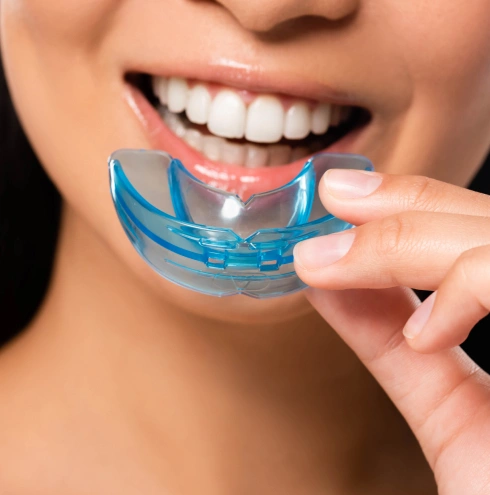
Night Guards
Protect Teeth with Nightguards
Nightguards, also referred to as dental or mouth guards, are designed to prevent the harmful effects of teeth grinding (bruxism). Typically made from durable acrylic resin, they come in soft or hard varieties based on your needs. Dentists usually recommend wearing a nightguard over the upper front teeth to prevent contact with the lower teeth during sleep.
For more severe cases of grinding, a lower dental guard may be advised. In addition to protecting your teeth, nightguards also help cushion and relieve tension in the jaw muscles, promoting greater comfort during rest.
Benefits of Using Nightguards for Bruxism
Bruxism, the unconscious habit of grinding teeth, can occur during the day or while sleeping, often triggered by stress, anger, or anxiety. While nightguards can't eliminate grinding entirely, they play a crucial role in protecting your teeth and oral health. Dentists often recommend nightguards alongside anxiety treatments to prevent further damage.
Nightguards help prevent harm to fillings, tooth chipping, loosening, and excessive wear of tooth enamel. They can also improve sleep quality and relieve bruxism-related symptoms, such as:
- Tooth sensitivity or discomfort
- Biting the cheeks
- Receding gums
- Fatigue from disrupted sleep
- Jaw muscle soreness or tightness
- Temple headaches
Benefits of Using Nightguards for TMJ
The temporomandibular joints (TMJ) are vital for the movement of your mouth, but grinding your teeth can cause issues with these joints, leading to TMJ disorders. Symptoms of TMJ include jaw pain, clicking or popping sounds, and a locked jaw, often triggered by grinding, inflammation, or jaw injuries.
Using a nightguard for TMJ can help properly align your jaws during sleep and reduce muscle tension. Nightguards not only protect your teeth but also provide relief from various TMJ symptoms, such as:
- Facial pain or discomfort
- Neck and shoulder pain
- Earache-like discomfort
- Ringing sensation in the ears
- Difficulty chewing or speaking
- Discomfort while eating or talking